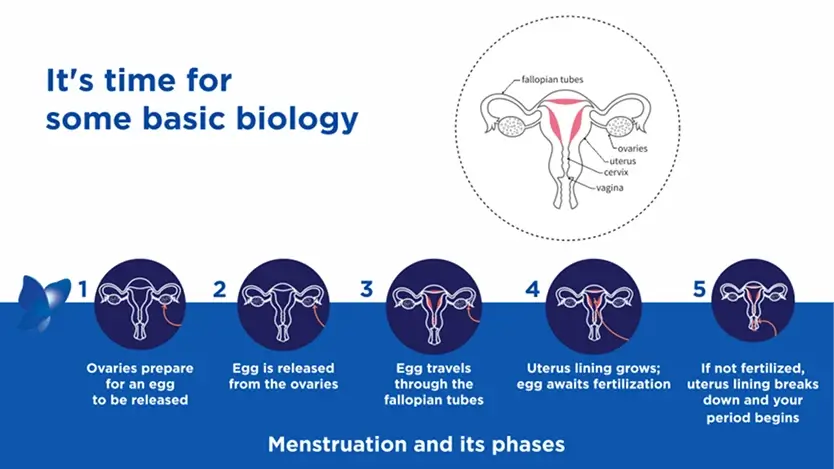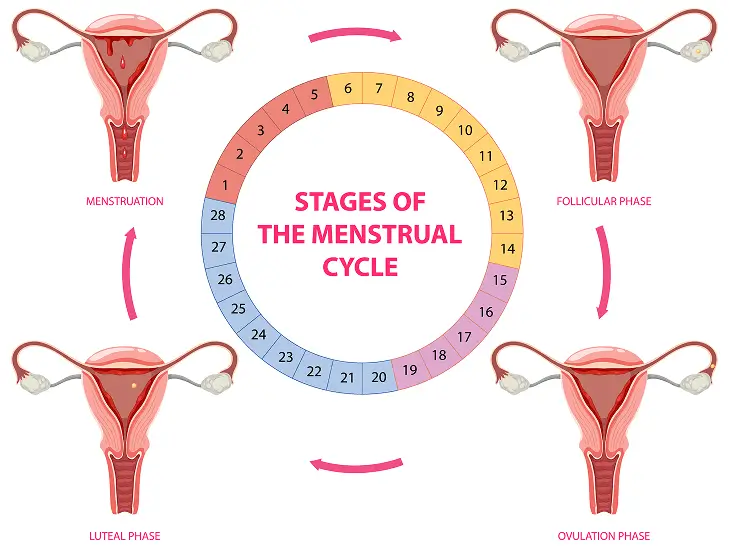About Periods: Everything You Need to Know
Most girls begin menstruating during puberty, i.e., the phase when children undergo several physical and emotional changes as their body transitions from a child to that of a young adult. Getting your period anytime between the ages 11 to 15 is completely normal as everybody has their own schedule. We have prepared a handy guide that will help you navigate the changes that your body is going through.

What is a Period?
Periods or menstruation is a natural biological process in which blood and tissue from your uterus come out from your vagina. This usually happens once a month. The onset of menstrual periods in girls is the body's way of preparing itself for a possible pregnancy. The ovaries are responsible for the release of the hormones, oestrogen, and progesterone. These female hormones signal the building up of the uterine lining or endometrium that nurtures a fertilized egg.
The same hormones signal the release of an egg from one of the ovaries during ovulation. This egg travels through the fallopian tube and attaches to the uterine lining - ready for fertilization. In the absence of a sperm cell to fertilize the egg, the uterine lining breaks down and is shed by way of a period.
This lining takes on an average of around 28 days to build up, break down, and eventually get shed. Most women experience a period cycle of anywhere between 21 to 35 days.
What is a period cycle?
The period cycle or menstrual cycle is the time between the first days of your last and next period. For example, if your last period started on the 10th of January and you get your next period on the 8th of February, your menstrual cycle is the time between January 10 and February 08.
It can be understood better in the following four stages:

- Menstrual Phase: Your uterine lining thickens up over a period of about 28 days and begins to shed as your period starts. The first day of your period is considered to be the first day of your menstrual cycle.
- Follicular Phase: An average period can last anywhere between 2 to 7 days and during this time the uterine lining is shed and discharged through your vagina. Once your period ends, the lining starts to thicken again – in preparation for a potential pregnancy.
- Ovulation Phase: Around day 14, the ovaries release an egg in a process called Ovulation which makes its way to the uterus where it can get settled in the uterine lining.
- Luteal Phase: If during this period, the egg is not fertilized, the lining of the uterus breaks down and begins to shed and you get your period again.

The entire cycle repeats itself every month from puberty when you first get your period to menopause i.e. when you cease to menstruate. Most women experience menopausal symptoms and eventual permanent stoppage of periods during the late 40s to early 50s.
When you first start getting your periods, your menstrual cycle is likely to be irregular and unpredictable for a couple of years. This is when your body is finding its natural rhythm and is absolutely normal. Once settled, you should get your periods once every month.
Why Do Periods Happen?
Menstruation is a key part of the reproductive cycle. If pregnancy does not occur, the uterus sheds its lining, leading to bleeding. This cycle prepares the body for potential pregnancy each month.
Do periods hurt?
Many women experience premenstrual syndrome or PMS during the weeks leading up to their period. This may be characterized by symptoms such as mood swings, acne, anxiety, bloating, feeling irritable or short tempered.
You are also likely to experience period pain during the first couple of days of your period. It can range between substantial cramps in your lower abdomen or dull stomach pain during periods accompanied by an aching lower back. While pain during the period is normal, if cramps during period become unbearable and start to interfere with your day-to-day life, it is better to pay your doctor a visit for a thorough examination of the underlying cause.
What are the different period management products?
One of the most important things that can make your periods a comfortable experience is using the right period product. Finding period products that suit your needs can take a bit of trial and error - be it sanitary pads or tampons. It is important to try a few different products before deciding what works for you. The kind of product that you use should be in line with the flow that you experience.
We understand that periods can be uncomfortable and painful. At LOVLUK Anion Sanitary Pads, we are dedicated to making period products that are safe and comfortable so that your periods don't stop you from living your life.
Key Takeaway
Periods are a natural part of growing up for girls and it is nothing to feel ashamed about. Try to have healthy conversations about periods with your parents, older siblings, or health care providers, or even your teachers if you have any doubts or questions about them.
How Lovluk Can Help You?
At Lovluk, we are committed to making period care simple, comfortable, and stress-free. Our rash-free, ultra-soft, and highly absorbent sanitary pads provide leak-proof protection, ensuring you stay fresh and confident all day. We also focus on menstrual health education, breaking taboos, and making high-quality period products affordable and accessible to all.
Experience the comfort and care you deserve - Shop Now
